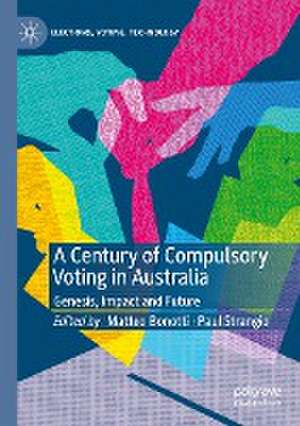A Century of Compulsory Voting in Australia: Genesis, Impact and Future: Elections, Voting, Technology
Editat de Matteo Bonotti, Paul Strangioen Limba Engleză Paperback – 15 mar 2022
| Toate formatele și edițiile | Preț | Express |
|---|---|---|
| Paperback (1) | 778.76 lei 6-8 săpt. | |
| Springer Nature Singapore – 15 mar 2022 | 778.76 lei 6-8 săpt. | |
| Hardback (1) | 783.98 lei 6-8 săpt. | |
| Springer Nature Singapore – 14 mar 2021 | 783.98 lei 6-8 săpt. |
Preț: 778.76 lei
Preț vechi: 949.71 lei
-18% Nou
Puncte Express: 1168
Preț estimativ în valută:
149.01€ • 156.00$ • 123.30£
149.01€ • 156.00$ • 123.30£
Carte tipărită la comandă
Livrare economică 05-19 aprilie
Preluare comenzi: 021 569.72.76
Specificații
ISBN-13: 9789813340275
ISBN-10: 9813340274
Ilustrații: XV, 272 p. 13 illus., 2 illus. in color.
Dimensiuni: 148 x 210 mm
Greutate: 0.35 kg
Ediția:1st ed. 2021
Editura: Springer Nature Singapore
Colecția Palgrave Macmillan
Seria Elections, Voting, Technology
Locul publicării:Singapore, Singapore
ISBN-10: 9813340274
Ilustrații: XV, 272 p. 13 illus., 2 illus. in color.
Dimensiuni: 148 x 210 mm
Greutate: 0.35 kg
Ediția:1st ed. 2021
Editura: Springer Nature Singapore
Colecția Palgrave Macmillan
Seria Elections, Voting, Technology
Locul publicării:Singapore, Singapore
Cuprins
Chapter 1: Introduction.- Chapter 2: How Australia Got Compulsory Voting.- Chapter 3: ‘A Lonely and Quixotic Battle’: A Short History of Agitation Against Compulsory Voting in Australia.- Chapter 4: Assessing Objections to Compulsory Voting in Australia.- Chapter 5: Public Opinion and Compulsory Voting in Australia.- Chapter 6: Non-Participation in Australian National Elections: Fault-Lines in the Compulsory Voting Consensus.- Chapter 7: Becoming an Informed Voter: Compulsory Voting and Developing Political Knowledge in Australia.- Chapter 8: ‘Choice of the Manner in Which Thou Wilt Die’: The Australian Courts on Compulsory Voting.- Chapter 9: Compulsory Voting: Activating the Demos and Enhancing Procedural Democracy in Australia.- Chapter 10: Public Reason, Compulsory Voting and Australian Democracy.- Chapter 11: More Representation, Less Radicalism: How Compulsory Voting Was Defended in Europe.- Chapter 12: Compulsory Voting: The View from Canada and the United States.
Notă biografică
Matteo Bonotti is a Senior Lecturer in Politics and International Relations at Monash University, having previously taught at Cardiff University, Queen’s University Belfast, and the University of Edinburgh. His research interests include democratic theory, political liberalism, the normative dimensions of partisanship and electoral design, linguistic justice, food justice, and free speech.
Paul Strangio is an Associate Professor of Politics at Monash University. Paul specialises in Australian political history with a particular focus on political leadership and political parties. He is an author and editor of eleven books.
Textul de pe ultima copertă
This volume provides valuable insight into how compulsory voting has worked over the last century in Australia and beyond. The collection includes contributions by historians, political theorists and empirical political scientists, and in addition to Australia it also considers how compulsory voting has been debated in Europe and North America. The authors address a wide variety of different aspects of the institution and offer analyses that will be highly relevant to all who take an interest in electoral institution design and voter participation.
Compulsory voting has operated in Australia for a century, and remains the best known and arguably the most successful example of the practice globally. By probing that experience from several disciplinary perspectives, this book offers a fresh, up-to-date insight into the development and distinctive functioning of compulsory voting in Australia. By juxtaposing the Australian experience with that of other representative democracies in Europe and North America, the volume also offers a much needed comparative dimension to compulsory voting in Australia. A unifying theme running through this study is the relationship between compulsory voting and democratic well-being. Can we learn anything from Australia’s experience of the practice thatis instructive for the development of institutional bulwarks in an era when democratic politics is under pressure globally? Or is Australia’s case sui generis – best understood in the final analysis as an intriguing outlier?
- Professor Sarah Birch, King’s College London
Political scientists, historians and legal scholars regularly examine facets of Australia’s system of compulsory voting. But, for the first time, this volume provides a comprehensive set of analyses, spanning the history, justification, administration, public support and opposition, and — critically — the political consequences of compulsoryvoting. A long overdue and rigorous contribution to our understanding of one of Australia’s most important yet most understudied and undervalued political institutions.
- Professor Simon Jackman, University of Sydney
Matteo Bonotti is a Senior Lecturer in Politics and International Relations at Monash University, having previously taught at Cardiff University, Queen’s University Belfast, and the University of Edinburgh. His research interests include democratic theory, political liberalism, the normative dimensions of partisanship and electoral design, linguistic justice, food justice, and free speech.
Paul Strangio is an Associate Professor of Politics at Monash University. Paul specialises in Australian political history with a particular focus on political leadership and political parties. He is an author and editor of eleven books.
Caracteristici
Presents an interdisciplinary analysis of Australia’s century-old experience of compulsory voting Offers a comparative analysis of compulsory voting in Australia with past and current experiences and debates on compulsory voting in Europe and North America Asks whether there is a relationship between compulsory voting and democratic well-being Questions if Australia’s experience of compulsory voting is instructive in an era when democratic politics is under pressure globally













